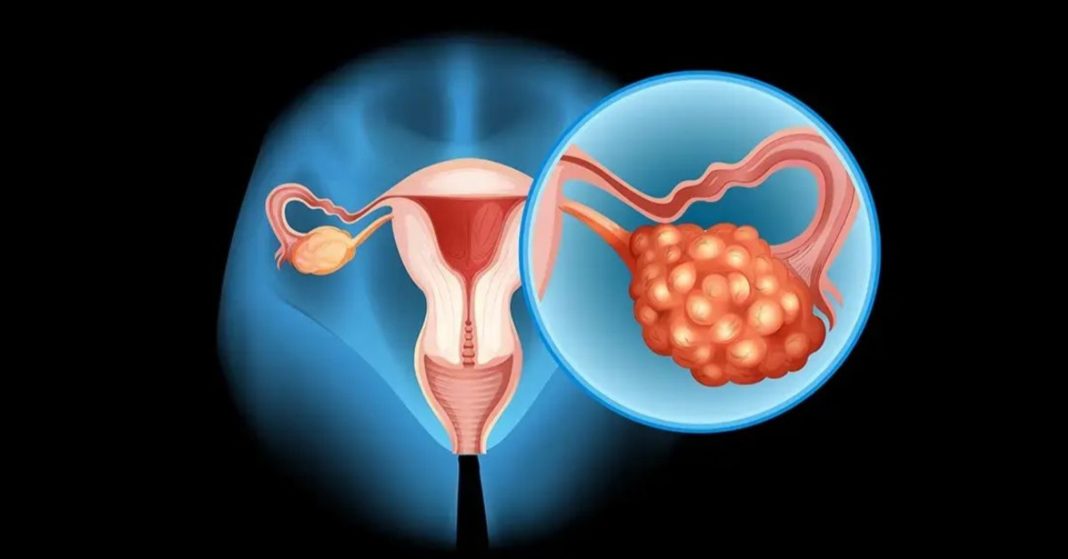Ovarian cancer is one of the most serious health problems that affects women, yet many people know very little about it. The main reason is that the symptoms of ovarian cancer are often hidden, mild, and mistaken for common stomach or digestion issues. This makes early detection difficult but extremely important, as treatment works best when the cancer is found early.
In this detailed blog, we will clearly explain the symptoms of ovarian cancer, why they happen, how to recognize them, and when to seek medical help. The information is written in simple words so that both 5th standard students and adults can easily understand.
What Are the Ovaries?
Before learning about the symptoms of ovarian cancer, it is important to know what ovaries are.
- Women have two ovaries located on each side of the uterus in the lower belly.
- Each ovary is about the size of an almond.
- They release eggs every month during the menstrual cycle.
- Ovaries also produce hormones like estrogen and progesterone, which control periods, pregnancy, and overall female health.
Since the ovaries are placed deep inside the body, early problems cannot be easily seen or felt.
Why Noticing the Symptoms of Ovarian Cancer Is Important
The biggest challenge with ovarian cancer is that the early-stage symptoms of ovarian cancer are very mild. Many women think the signs are related to regular digestion or age-related changes. But when the cancer grows, the symptoms become stronger and harder to ignore.
Doctors say that if women notice these signs early and visit a doctor quickly, the chances of survival and recovery increase greatly. That is why knowing the symptoms of ovarian cancer can save lives.
Common Symptoms of Ovarian Cancer
Here are the most frequent symptoms of ovarian cancer that women should watch carefully:
1. Bloating and Swelling of the Abdomen
One of the most common symptoms of ovarian cancer is constant bloating. Unlike normal bloating that comes and goes, cancer-related bloating:
- Happens almost daily.
- Makes the stomach feel full and tight.
- Does not improve with small diet changes.
2. Pain or Pressure in the Pelvis and Lower Belly
- A continuous dull ache, sharp pain, or heavy pressure in the pelvic area.
- This pain feels different from normal period cramps.
- The discomfort may spread to the back or thighs.
3. Changes in Appetite and Eating Habits
- Feeling full very quickly after eating small amounts.
- Loss of appetite without any clear reason.
- Some women also feel nausea or indigestion regularly.
4. Changes in Urination Patterns
Frequent urination is another common symptom of ovarian cancer. Signs include:
- Needing to urinate more often than usual.
- Feeling urgent pressure to go but little urine coming out.
- Trouble controlling the bladder.
5. Digestive or Bowel Problems
- Constipation that does not improve with normal home remedies.
- Stomach upset, diarrhea, or frequent gas.
- Feeling pressure in the abdomen.
6. Fatigue and Weakness
- Tiredness even after enough sleep.
- Low energy levels that make it difficult to do daily activities.
7. Back Pain
- Pain in the lower back without any injury or other medical reason.
- This pain is usually long-lasting and not linked to heavy work.
8. Unusual Menstrual or Hormonal Changes
- Periods that become irregular or much heavier.
- Spotting or bleeding after menopause, which should never be ignored.
Less Common but Serious Symptoms of Ovarian Cancer
While not as common, the following symptoms of ovarian cancer may also appear:
- Unexplained weight loss even without dieting.
- Pain during or after sexual activity.
- Constant indigestion or heartburn.
- Feeling breathless or having trouble eating due to swelling in the stomach.
How Long Should Symptoms of Ovarian Cancer Last Before Seeking Help?
Many women confuse the symptoms of ovarian cancer with normal digestion issues. But here is a useful guideline:
- If these symptoms occur more than 12 times a month,
- If they last for more than 2–3 weeks,
- Or if they keep getting worse over time,
you should visit a gynecologist immediately.
Why Are Symptoms of Ovarian Cancer Often Missed?
- Hidden location: Ovaries are deep inside the body, so problems are not visible.
- Similar to common problems: Symptoms look like gas, constipation, or menstrual cramps.
- No simple test: Unlike cervical cancer (Pap smear test), there is no routine test for ovarian cancer.
This is why awareness of the symptoms of ovarian cancer is the first step in saving lives.
What to Do If You Notice Symptoms of Ovarian Cancer
If you suspect you may have the symptoms of ovarian cancer, follow these steps:
- Keep a Symptom Diary: Write down when the symptoms happen and how often.
- Visit a Doctor: A gynecologist can recommend tests such as ultrasound or blood tests.
- Do Not Ignore: Even mild symptoms, if repeated often, should not be ignored.
- Seek Early Medical Care: Early diagnosis improves the chances of successful treatment.
Conclusion
The symptoms of ovarian cancer may appear small at first, but if they continue or worsen, they should never be ignored. Bloating, belly pain, changes in eating or urination, and unusual fatigue are key warning signs. Listening to your body and seeking medical advice early can save lives.
Remember: Awareness is the first step in fighting ovarian cancer.



